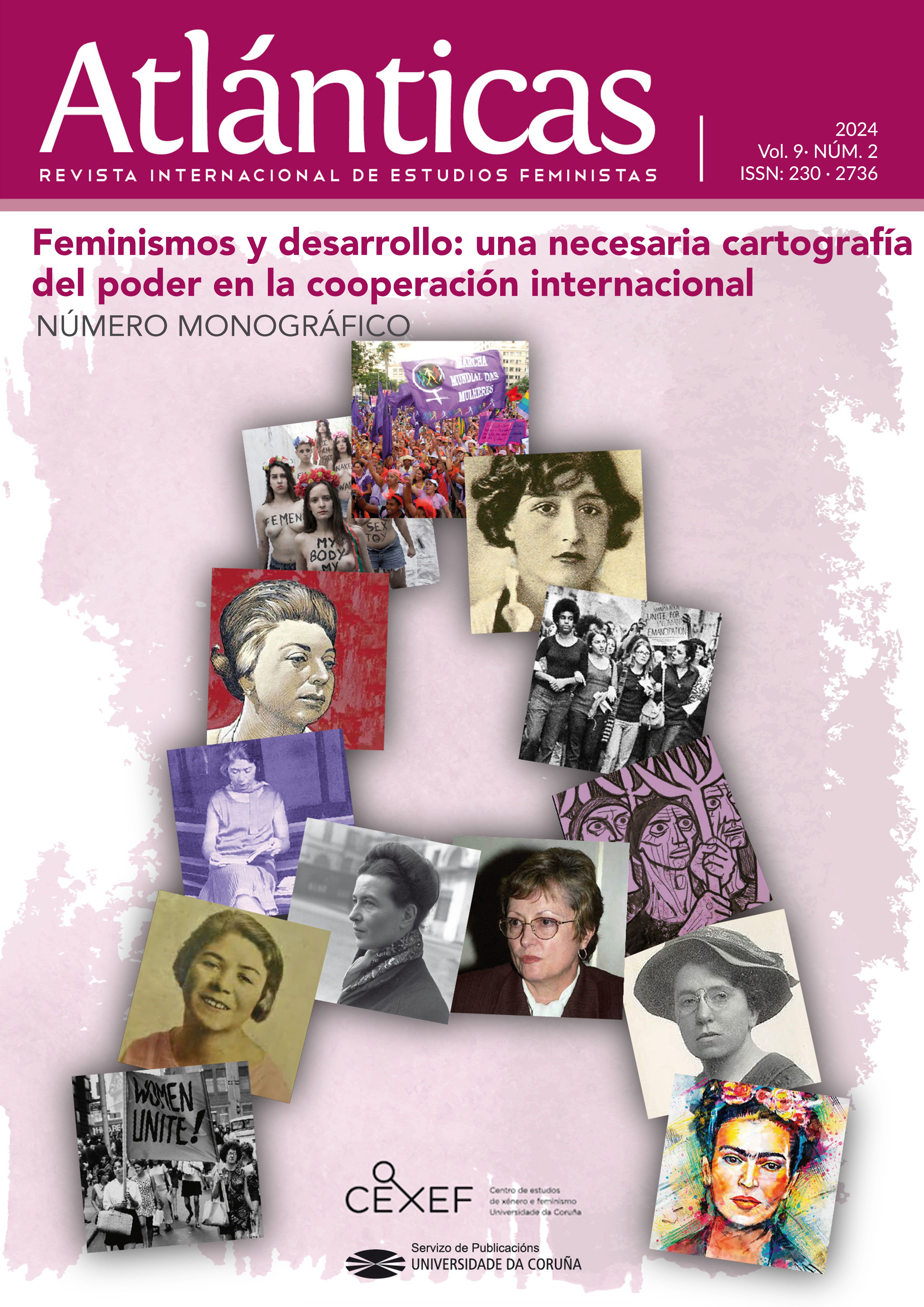Menstruation and school. Challenges and opportunities for a feminist development cooperation.
Main Article Content
Abstract
In the first decade of the 21st century, the first projects focusing on menstrual hygiene were developed with the aim of reducing girls' absenteeism from school. These projects were based on a representation of girls as precarious menstruating bodies, (re)constructing Western expectations of normality for the female body. Furthermore, by focusing on hygiene management, these interventions tend to reinforce the idea of the female body as dirty and to be managed in the private sphere. The proposed approach thus responds to and sometimes reinforces gender norms, contributing to the production of docile a-menstrual bodies.
In Santa Rosa de Copán, the school is also recognized as an ideal place to improve knowledge about menstruation because of its wide reach. However, information on the subject is inadequate and does not correspond to existing policies. Furthermore, a traditional view persists that associates menstruation exclusively with the female body and sexual reproduction. The sexual division that is taught serves as a device of gendering the body, perpetuating cultural practices and social norms that justify gender inequality. In this context, the participants have shown an interest in receiving support from the cooperation sector. Thus, it is possible to assume a strategic authority to accompany the agency of local women (and others) in leading change.
Keywords:
Downloads
Article Details
References
Accerenzi, M. (2023a). Políticas corporales, menstruación y cooperación al desarrollo. Un estudio de caso en Santa Rosa de Copán, Honduras. [Tesis doctoral, Universidad del País Vasco]. https://addi.ehu.es/handle/10810/61154
Accerenzi, M. (2023b). Políticas menstruales y desarrollo. Una crítica al abordaje de la menstruación en el ámbito de la cooperación internacional. Cuadernos de Trabajo/Lan-Koadernoak Hegoa, N. 93. https://ojs.ehu.eus/index.php/hegoa/issue/view/2044
Bobel, C. (2019). The Managed Body. Developing Girls and Menstrual Health in the Global South. Palgrave Macmillan. [Pdf version]
Del Río Martínez, A. y Dema Moreno, S., coord. (2013). Voces y saberes feministas. Hacia una agenda de cooperación emancipadora. Hegoa.
Foucalt, M. (2011 [1977]): Historia de la sexualidad /Vol. 1. La voluntad de saber. Traducido por Ulises Guiñazú. Siglo XXI Internacional Mexico. [Kindle edition].
Fusaschi, M. (2011). Quando il corpo è delle altre. Retoriche della pietà e umanitarismo-spettacolo. Bollati Boringhieri editore. [Kindle edition]
García Castaño, F. J., Rubio Gómez, M. y Fernández Echevarría, J. (2018). Las trampas de la diversidad. Sobre la producción de diferencias en la escuela. Gazeta de Antropología, 2018, 34 (1). http://hdl.handle.net/10481/54679
Gaybor, J. y Harcourt, W. (2021): Seeing the color red: Menstruation in global body politics. Global Public Health. https://doi.org/10.1080/17441692.2021.2016886
Gómez-Quintero, J. D., y Franco Martínez, J. A. (2011). La agenda oculta de la igualdad de género en el desarrollo. Andamios, Volumen 8, N. 17, 37-60.
Guilló Arakistain, M. (2013). La in-corporación dela investigación: políticas de la menstruación y cuerpos (re)productivos. Nómadas (Col), N. 39, 233-245. Universidad Central de Colombia.
Guilló Arakistain, M. (2020). Challenging Menstrual Normativity: Nonessentialist Body Politics and Feminist Epistemologies of Health. En C. Bobel, I. T. Winkler, B. Fahs, K. A. Hasson, E. A. Kissling y T. A. Roberts, (Eds). The Palgrave Handbook of Critical Menstruation Studies (pp. 869-883). Palgrave McMillan.
Guilló Arakistain, M. (2023). Sangre y resistencia. Políticas y culturas alternativas de la menstruación. Bellaterra Edicions.
Harcourt, W. (2009). Body politics in development. Critical debates in gender and development. Zed Books. [Kindle edition]
Hennegan, J., Winkler, I. T., Bobel, C., Keiser, D., Hampton, J., Larsson, G., Chandra-Mouli, V., Plesons, M., Mahon, T. (2021). Menstrual health: a definition for policy, practice, and research. Sexual and Reproductive Health Matters, 29:1, 1911618. https://doi.org/10.1080/26410397.2021.1911618
Jolly, S. (2004). Desarrollo y género en breve. Boletín de BRIDGE. Edición especial.
Lahiri-Dutt, K. (2014). Medicalising menstruation: a feminist critique of the political economy of menstrual hygiene management in South Asia. Gender, Place and Culture. https://doi.org/10.1080/0966369X.2014.939156
Lugones, M. (2008). Colonialidad y género. Tabula Rasa, N. 9, 73-101. https://www.revistatabularasa.org/numero-9/05lugones
Martin, E. (1987). Medical Metaphors of Women’s Bodies: Menstruation and Menopause. En E. Martin. Woman in the Body: a cultural analysis of reproduction (pp. 27-53). Beacon.
Martin, E. (1991). The Egg and the Sperm: How Science Has Constructed a Romance Based on Stereotypical Male-Female Roles. Signs, 16:3, 486-501.
Mohanty, C. T. (1991). Under Western Eyes: Feminist Scholarship and Colonial Discourses. En C. T. Mohanty, A. Russo y L. Torres (eds). Third World Women and the Politics of Feminism. Bloomington: Indiana UP.
Mythri Speaks (2016). Menstruation: Rhetoric, Research, Reality. https://mythrispeaks.wordpress.com/2016/06/13/menstruation-rhetoric-research-reality/
Olmos Alcaraz, A. y Rubio Gómez, M. (2013). Corporalidad del «buen estudiante»: representaciones de género, «raza», etnia y clase social en la escuela española. Revista Iberoamericana de Educación, N. 62 (2013), 163-179.
Rubio Gómez, M. (2013). Construyendo diferenticas desde la retórica de la igualdad: el caso del alumnado denominado latinoamericano en la etapa de educación secundaria obligatoria. Tesis doctoral. Editorial de la Universidad de Granada.
Rubio Gómez, M. y Olmos Alcaraz, A. (2013). Construcción social del “mal estudiante” en la escuela pública española: intersecciones de género, “raza”/etnia y clase social. Diálogos sobre Educación, año 4, N. 7.
Sassatelli, R. (2004). Body Politics. En E. Amenta, K. Nash, y A. Scott (Eds). The Wiley-Blacwell Companion to Political Sociology, (pp. 347-358). Blackwell Publishing Ltd.
Scheper-Hughes, N., y Lock, M. (1987). The Mindful Body: A prolegomenon to Future Work in Medical Anthropology. Medical Anthropology Quarterly, Vol. I, 6-41.
Tarzibachi, E. (2017). Cosa de mujeres Menstruación, género y poder. Penguin Random House Grupo Editorial Argentina. [Kindle edition]
USAID/MESCLA (2019). Estudio de la violencia basada en género en el occidente de Honduras. https://pdf.usaid.gov/pdf_docs/PA00TVMV.pdf
World Bank (2022). Creating Markets in Honduras: Country Private Sector Diagnostic (English). http://documents.worldbank.org/curated/en/099028308052239516/IDU0ee3caf2805321044fa0af840421771bb4c2c

